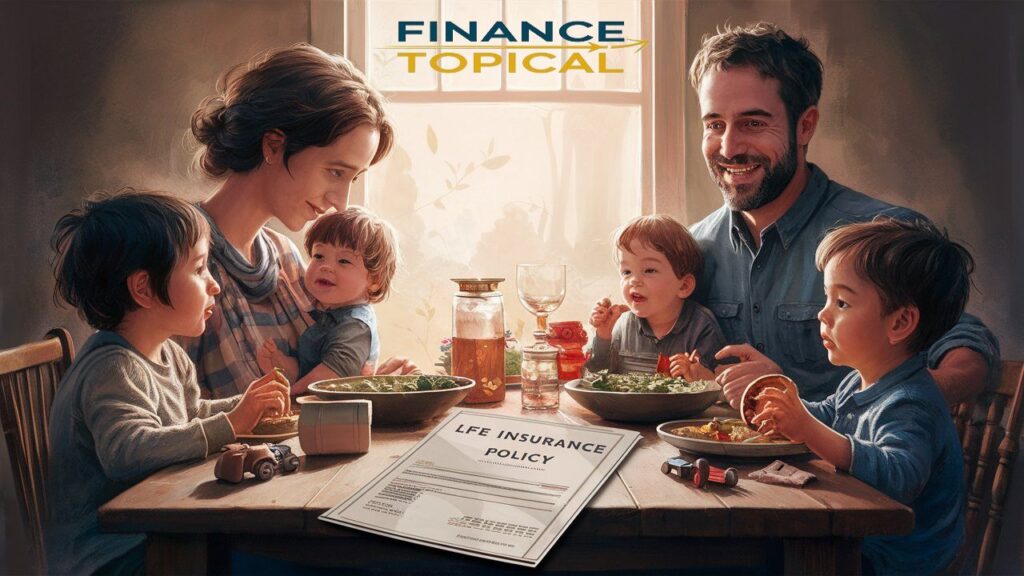You’ve probably heard of Martin Lewis – the money-saving expert whose advice guides financial decisions for millions across the UK. But does the frugal-living guru actually recommend taking out life insurance policies? This article will examine Martin Lewis’ stance on life insurance, weighing the pros and cons he outlines to help readers decide if it’s a wise investment for their circumstances.
Why does Martin Lewis recommend life insurance?
Martin Lewis recommends life insurance primarily for families where one or more individuals’ income is depended upon to maintain the household’s standard of living.
His rationale is rooted in protecting against the financial hardship that would arise if that income stream was suddenly lost due to an untimely death.
For example, imagine a scenario where one spouse works full-time while the other is a stay-at-home parent caring for young children.
If the working spouse passed away unexpectedly, the loss of their earnings could make it extremely difficult for the surviving spouse and kids to afford:
- Mortgage/rent payments
- Daily living expenses (food, utilities, transportation, etc.)
- Future costs like university tuition
A sizable life insurance payout could provide a much-needed financial cushion to maintain the family’s way of life and long-term plans during such a difficult transition.
However, Lewis underscores that life insurance isn’t a wise investment for those without dependents relying on their income. This aligns with his overarching philosophy of only purchasing insurance coverage to mitigate meaningful financial risks.
Read More about Openhouseperth Insurance

Who is Martin Lewis and what is MoneySavingExpert.com?
Martin Lewis is a renowned personal finance expert, journalist and consumer champion based in the UK. He’s best known as the founder of the wildly popular MoneySavingExpert.com website.
MoneySavingExpert.com is a free online resource that provides tips, tools and guides to help consumers maximize their money through savvy financial decisions. Some key facts about the platform:
- Launched in 2003, it now has over 7 million monthly users
- Covers topics like banking, credit cards, mortgages, insurance and more
- Contains calculators, best-buy product comparisons and customer support forums
- Martin Lewis and his team of researchers rigorously fact-check all published information
- The site famously has no external advertisements or sponsored content to remain unbiased
In addition to MoneySavingExpert.com, Lewis is a frequent media commentator and has published multiple bestselling books on personal finance. He’s renowned for his passionate, easy-to-understand guidance while maintaining journalistic integrity by never accepting paid endorsements.
Lewis has received numerous industry accolades over the years, including:
- Being appointed a CBE (Commander of the Most Excellent Order of the British Empire) in 2014 for services to consumer rights
- Earning the Consumer Champion honor at the 2023 British Banker’s Association Awards
Millions of UK households look to Lewis as a trusted voice unraveling the complexities of managing money wisely.
Does Martin Lewis recommend MoneySupermarket life insurance?
No, Martin Lewis has not explicitly recommended any specific life insurance companies or policies like those from MoneySupermarket. His approach is to provide impartial guidance that empowers consumers to make well-informed decisions tailored to their personal circumstances.
On MoneySavingExpert.com, Lewis urges readers to use accredited life insurance comparison sites to obtain multiple quotes before purchasing coverage. While he doesn’t endorse particular insurers, the site does feature a dedicated “Life Insurance Policies” channel serving as an educational starting point.
This channel covers key need-to-knows like:
- When life insurance is worthwhile versus unnecessary
- Types of policies (term vs whole life insurance)
- Calculating how much coverage your family requires
- Tips for getting the best premiums by shopping around
- Pros and cons of purchasing life insurance through an employer
The core guidance is to research your options thoroughly using a reputable comparison site or broker once you’ve determined life insurance is the right choice for your situation.
What does Martin Lewis say about life insurance?
Martin Lewis’ overarching stance on life insurance can be summarized by three key principles:
- It’s essential for families that rely on your income.
Lewis adamantly states life insurance is a must if you have dependents who would struggle financially in the event of your death. This includes spouses, children or other relatives you financially support. - Term life insurance is usually the best value option.
Lewis recommends affordable term life insurance policies over costlier whole life plans for most people. Term life provides coverage for a set period (e.g. 20-30 years) when expenses like mortgages and children’s costs are highest. - Only pay for it if you genuinely need it.
On the flip side, Lewis says there’s no reason to pay unnecessary life insurance premiums if you’re single with no dependents relying on your income stream. The money is better invested elsewhere.
Additionally, Lewis advocates purchasing life insurance sooner rather than later, as premiums become more expensive as you age. He also stresses:
- Calculating how much total coverage your loved ones would need to maintain their lifestyle
- Shopping around to find the cheapest policy meeting your coverage level
- Reviewing your coverage needs whenever your family situation changes
In summary, Martin Lewis’ advice is to take out sufficient, affordable term life insurance if you have dependents – but avoid the unnecessary costs if loss of your income wouldn’t create hardships for others.
What does MoneySavingExpert.com say about life insurance?
MoneySavingExpert.com contains an extensive Life Insurance guide packed with need-to-know info aligned with Martin Lewis’ recommendations. A few key sections:
Do people with no dependents need life insurance?
“If you have no spouse, children or relatives who’ll be left to struggle financially when you pop your clogs, you shouldn’t get life insurance.”
This section advises against single people without dependents getting life insurance, as there’s no one directly reliant on their income. The site says those without dependents should prioritize savings and investments over paying costly premiums.
Have you got life cover from your employer, and is that enough?
Many employers provide staff with basic life insurance coverage equal to 1-4 times their salary. This coverage level may suffice if you’re single with no mortgage. But Lewis says those with dependents likely need supplementary individual policies to have adequate protection.
The guide provides an in-depth walkthrough on how to calculate if you need additional coverage beyond your workplace policy. This includes considering future expenses like children’s education.

What is the Martin Lewis Life Insurance formula?
Martin Lewis doesn’t prescribe a rigid formula for calculating your life insurance needs. His guidance is principle-based:
The ‘TEN TIMES annual income’ rule…
As a general rule of thumb, Lewis suggests getting life insurance coverage equal to roughly 10 TIMES your annual income if you have dependents who rely on that money.
For example, if your yearly salary is £35,000, you may want a £350,000 life insurance payout to replicate that income stream for an extended period after your death.
However, Lewis acknowledges this is an oversimplified benchmark. Calculating your true required coverage level depends on multiple factors:
Four of the key things with Martin Lewis’s Life Insurance cover guidance:
- Outstanding Debts: Coverage should account for any large outstanding debts like a mortgage balance.
- Dependent Children’s Expenses: Factor in costs until all children become financially independent adults (e.g. education, childcare).
- Spouse’s Income & Pension Pots: Will there be other income sources? What about inheritable pensions or investments?
- Lifestyle Expectations: How much is needed to sustain your current household’s quality of life longterm?
Lewis advises using online life insurance calculators that crunch the numbers based on these variables.
The goal is determining a lump sum that, when combined with other income/assets, lets your family maintain their living standard long-enough for children to reach adulthood and the surviving spouse to adjust financially.
Ultimately, Martin Lewis’ life insurance guidance focuses on protecting dependents against undue financial hardship – not leaving behind excessive “formulas”.
His advice promotes purchasing adequate yet affordable coverage customized to your family’s circumstances.
Martin’s Take on Life Insurance Specifically
However, when it comes to life insurance, Lewis adopts a more nuanced stance. He views it as essential coverage for families who would face significant financial hardship due to the death of a primary breadwinner. Specifically, Lewis recommends affordable term life insurance policies over more expensive whole life options.
But he underscores a crucial caveat – only get life insurance coverage if you have dependents actually relying on your income.
As he’s quoted saying, “If you have no spouse, children or relatives who’ll be left to struggle financially when you pop your clogs, you shouldn’t get life insurance.“
Counterarguments Against Life Insurance
Despite his advocacy for life insurance in certain circumstances, Lewis acknowledges some valid counterarguments:
- Costs Can Add Up: Life insurance premiums are an ongoing expense that cuts into income that could otherwise be invested or saved.
- Limited Benefit if No Dependents: For single individuals or couples with no children, the death benefit payouts don’t serve the same financially protective purpose.
- Homeowners vs. Renters: His advice can vary based on whether you’re a homeowner with outstanding mortgage debts or simply renting housing.
Policy Selection Tips from Lewis
For those who do need life insurance based on his criteria, Lewis provides guidance on selecting appropriate policies:
- Adequate Coverage Amount: He suggests calculating the lump sum your family would need to maintain their current lifestyle and cover expenses like remaining mortgage payments, education costs, etc. Online calculators can help estimate this figure.
- Shop Around for Best Rates: Like any financial product, Lewis stresses the importance of comparing quotes from multiple insurers to find the most affordable premiums. He warns against just defaulting to your bank’s policy.
- Research Shortcut: To simplify the research process, Lewis recommends using the curated life insurance guide on his MoneySavingExpert.com site as a comprehensive starting point.
Case Studies
To illustrate when he advocates for or against life insurance policies, let’s examine some hypothetical household scenarios Lewis might evaluate:
| Household Situation | Martin’s Likely Advice |
|---|---|
| Young married couple, both working, no children yet | No urgent need for life insurance currently. But plan to revisit once you have kids depending on your circumstances. |
| Single-income family with 3 school-age kids | Life insurance for the breadwinner is essential! Cover the insurance gap until kids are independent to ensure their living costs are covered. |
| Retired couple with grown working children | Life insurance is unnecessary at this stage if you have enough savings/pensions and your kids are financially stable themselves. |
| Single businessowner with no kids | No need for personal life insurance if the business could still operate without you. But consider insurance like critical illness to cover living costs if unable to work. |
As these examples illustrate, Lewis takes a pragmatic approach – recommending life insurance when there are clear dependents who rely on that income stream, but advising against it in scenarios where there’s no one to directly financially protect.

Conclusion
In summary, Martin Lewis acknowledges that life insurance is a necessary evil for some families to safeguard their financial futures. But it’s an avoidable cost for others based on their life stages and lack of dependents. His advice boils down to this consumer-minded view:
“Life insurance isn’t ‘death safe’ as some people think. It’s a financial protection that enables those left behind to cope in very difficult circumstances. For many people though, the protection simply isn’t needed.”
Whether you fall into the “life insurance is essential” or “skip the premiums” camp, Lewis’ guidance champions making an informed choice aligned with your specific situation and priorities. His myth-busting approach equips consumers to cut through marketed hype and make prudent money decisions.

Daniel, a seasoned professional with over 5 years of experience in banking, property, and finance, brings a wealth of expertise to the table. This authoritative blog is meticulously curated to provide you with the most up-to-date financial insights. Delving into the dynamic realms of banking and mortgages, Daniel’s passion for finances shines through every post.










